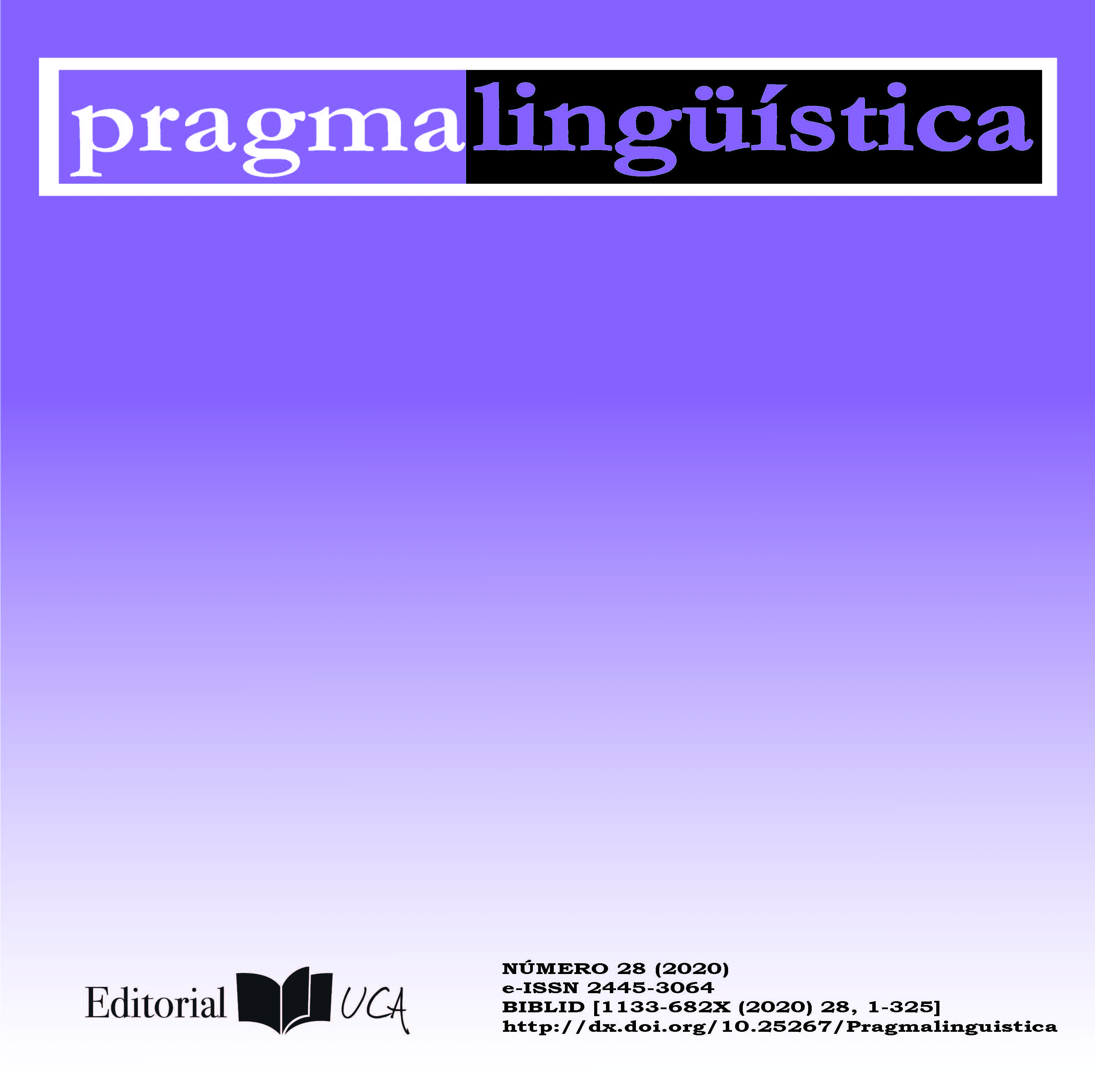Politeness in academic discourse of journalism Department in the Central University "Marta Abreu" of Las Villas
Abstract
The research characterizes, from a pragmalinguistic perspective, the communication between professors and students of the Journalism degree at the Central University "Marta Abreu" of Las Villas (UCLV) in 2016, during the defense of Diploma Works. The theoretical and methodological proposal of Brown and Levinson on verbal courtesy is used. In the results, the paternalistic and instructional-educational relationships and functions are evidenced according to the power and hierarchy assigned to the participants (teachers and student-researchers). Likewise, the voices of the professors (such as tutors, opponents or members of evaluation tribunals) are made clear, allowing clear and precise communication to be established with the students to provide information on the student's research (quality of the investigative process, of written memory and the act of defense), educate them based on the recognition of their certainties and limitations as a researcher in communication, and establish empathy with them during the evaluation process.
Keywords
Downloads
How to Cite
License
Copyright (c) 2020 Yadán Crecencio Galañena León

This work is licensed under a Creative Commons Attribution-NonCommercial-NoDerivatives 4.0 International License.
References
ABREU GAIZA, R. C.; GALAÑENA LEÓN, Y. C. & SORÍ VELÁZQUEZ, G. (2017): “Ideología en The New York Times y El Nuevo Herald: Análisis Ideológico del discurso periodístico sobre el tema relaciones Cuba-Estados Unidos”, Estudios sobre el Mensaje Periodístico, 23, pp. 709-726. DOI: org/10.5209/ESMP.58011.
ALBELDA MARCO, M. (2005): “Discordancia entre atenuación/cortesía e intensificación/descortesía en conversaciones coloquiales”, Blas, J., Casanova, M. y Velando, M. (eds.): Discurso y sociedad. Contribuciones al estudio de la lengua en contexto social, Castelló de la plana: Publicaciones de la Universitat Jaume I, D.L., pp. 577-586.
ÁLVAREZ, A. & ESPAR, T. (2002): “Cortesía y poder: Un acercamiento socio-semiótico”, Lengua y habla. Número 7. Disponible en: https://dialnet.unirioja.es/servlet/articulo?codigo=4004043 (Fecha de consulta 23/06/2020)
BERMÚDEZ SÁNCHEZ, M. (2016): “Prosodia y discurso académico: un análisis funcional de la entonación en su dimensión textual y significativa”, Islas. Número 182, pp. 195-211.
BERNAL LINNERSAND, M. (2007): Categorización sociopragmática de la cortesía y de la descortesía. (Tesis doctoral) Departamento de Estudios Españoles, Portugueses y Latinoamericanos, Universidad de Estocolmo. Disponible en https://www.asice.se/index.php/tym/article/view/63/102 (Fecha de consulta 23/06/2020).
BOUSFIELD, D. (2008): Impoliteness in Interaction, Amsterdam/Philadelphia: John Benjamins Publishing Company.
BRAVO, D. & BRIZ GÓMEZ, A. (2004): Pragmática sociocultural: estudios sobre el discurso de cortesía en español, Barcelona: Ariel.
BRIZ, A. (1998): El español coloquial en la conversación, Barcelona: Ariel.
BROWN, P. & LEVINSON, S. (2013): Politeness. Some universals in language usage, New York: Cambridge University Press.
CHÁVEZ CÁMARA, G. & GARCÉS PÉREZ, M. (2018): “De la enfermedad al paciente: la cortesía verbal en el contexto oncológico”, Convención Internacional de Salud. Disponible en http://www.convencionsalud2018.sld.cu/index.php/connvencionsalud/2018/paper/view/915/879 (Fecha de consulta 23/06/2020).
CROSS, A. (1995): “El discurso académico como discurso argumentativo. EL argumento de autoridad en la primera clase de un curso académico”, Comunicación, Lenguaje y Educación, 25, pp. 95-106.
CUENCA DÍAZ, M. et al. (2016): “La evaluación en la educación superior desde la teoría socio histórico cultural”, Revista Mikarimin, 1, pp. 35-48. Recuperado a partir de https://bardo6.files.wordpress.com/2017/11/15-cuenca-et-al-2016-nuevo.pdf (Fecha de consulta 23/06/2020).
CULPEPER, J. (2005): “Impoliteness and entertainment in the television quiz show: The Weakest Link”, Journal of Politeness Research, 1, pp. 35-72.
DÍAZ QUIÑONES, J. A. & VALDÉS GÓMEZ, M. L. (2017): “La función del profesor en el proceso de enseñanza aprendizaje en la educación superior cubana”, Medisur, 1, pp. 4-7. Disponible en http://scielo.sld.cu/pdf/ms/v15n1/ms02115.pdf (Fecha de consulta 23/06/2020).
FUENTES RODRÍGUEZ, C.; ALCAIDE LARA, E. & BRENES PEÑA, E. (eds.) (2011): Aproximaciones a la (des)cortesía verbal en español. Berna: Peter Lang.
GOFFMAN, E. (1967). Interactional ritual: Essays on face-to-face behaviour. New York: Doubleday.
GÓMEZ MORÓN, R. (1997): “La descortesía no intencionada y el discurso no cortés. El fallo pragmatic”, Revista The Grove, 3, pp. 33-47.
GRICE, H. P. (1975): “Logic and conversation”, Syntax and Semantic 3: Speech acts. Volumen 3. Disponible en http://www.sfu.ca/~jeffpell/Cogs300/GriceLogicConvers75.pdf (Fecha de consulta 23/06/2020).
GUTIÉRREZ RÍOS, Y. (2009): “El discurso académico oral en el marco de la nueva retórica”, Revista Iberoamericana de Educación, 6, pp. 1-10. Disponible en https://rieoei.org/RIE/article/view/1937 (Fecha de consulta 23/06/2020).
HAVERKATE, H. (1994): La Cortesía Verbal. Estudio Pragmalingüístico. Madrid: Editorial Gredos.
KASPER, G. (1990): “Linguistic politeness. Current research issues”, Journal of Pragmatics, 14, pp. 193-219.
LÓPEZ SERENA, A. (2017): “Hacer (cosas con) palabras: la discursividad como universal genérico-esencial del lenguaje”, Círculo de Lingüística aplicada a la Comunicación. Número 68, pp. 88-103. Disponible en https://revistas.ucm.es/index.php/CLAC/article/view/55319 (Fecha de consulta: 22/06/2020).
MOLINA RODRÍGUEZ, L. & LUGONES MURO, M. (2017): “La reproducción de las ideologías de grupo a través del discurso periodístico. Análisis de una publicación periódica cubana”, Círculo de Lingüística aplicada a la Comunicación, 71, pp. 203-224. Disponible en http://www.ucm.es/info/circulo/71/molina.pdf (Fecha de consulta: 22/06/2020).
SEARLE, J. R. (1977): “Actos de habla indirectos”, Teorema: Revista Internacional de Filosofía, 1, pp. 23-54.
SPENCER-OATEY, H. (2007): Theories of identity and the analysis of fase. Journal of Pragmatics, 39(4), pp. 639-656.
THOMPSON, J. B. (1993): Ideología y cultura moderna. Teoría Social en la era de la comunicación de masas. Ciudad México: Universidad Autónoma Metropolitana.
VAN DIJK, T. A. (2003): “La multidisciplinaridad del análisis crítico del discurso: un alegato en favor de la diversidad”, Wodak, R., y Meyer, M. (eds.): Métodos de análisis crítico del discurso, Barcelona: Gedisa, pp. 143-177.
VAN DIJK, T. A. (2005): “Ideología y análisis del discurso”, Utopía y Praxis Latinoamericana, 29, pp. 9-36.
VÁZQUEZ, G. (s.f.): El discurso académico español: Entre la identidad académica y la globalización del conocimiento. Universidad Libre de Berlín. Disponible en https://cvc.cervantes.es/ensenanza/biblioteca_ele/asele/pdf/20/20_0117.pdf (Fecha de consulta: 23/06/2020).
WATTS, R. (2003): Politeness. Cambridge: Cambridge University Press.







